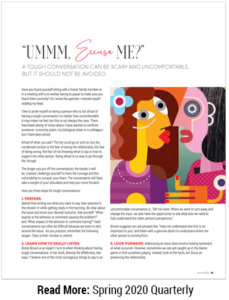UMMM, EXCUSE ME?
The following post was originally published in the Spring 2020 issue of the Quarterly.
TOUGH CONVERSATIONS CAN BE SCARY AND UNCOMFORTABLE, BUT THEY SHOULD NOT BE AVOIDED.
 Have you found yourself sitting with a friend, family member or in a meeting with a co-worker having to pause to make sure you heard them correctly? As I wrote this question, I noticed myself nodding my head.
Have you found yourself sitting with a friend, family member or in a meeting with a co-worker having to pause to make sure you heard them correctly? As I wrote this question, I noticed myself nodding my head.
I like to pride myself on being a person who is not afraid of having a tough conversation no matter how uncomfortable it may make me feel, but this is not always the case. There have been plenty of times where I have wanted to confront someone—a sorority sister, my biological sister or a colleague— but I have been afraid.
Afraid of what, you ask? The list could go on and on, but the condensed version is the fear of losing the relationship, the fear of being wrong, the fear of not knowing what to say or how to support the other person. Being afraid is no way to go through life, though.
The longer you put off the conversation, the harder it will be. Instead, challenge yourself to have the courage and the vulnerability to conquer your fears. The conversation will likely take a weight off your shoulders and help you move forward.
Here are three steps for tough conversations:
1. PREPARE
Spend time writing out what you want to say, then practice in the shower or while getting ready in the morning. Be clear about the issue and know your desired outcome. Ask yourself: “What exactly is the behavior or comment causing the problem?” and “What impact is the behavior or comment having?” Hard conversations can often be difficult because we want to skirt around the issue. As you practice, remember the following slogan: Clear is kind. Unclear is unkind.
2. LEARN HOW TO REALLY LISTEN
Brene Brown is an expert I turn to when thinking about having tough conversations. In her book, Braving the Wilderness, she says, “I believe one of the most courageous things to say in an uncomfortable conversation is, ‘Tell me more.’ When we want to turn away and change the topic, we also have the opportunity to ask what else we need to fully understand the other person’s perspective.” Brown suggests we use phrases like, “Help me understand why this is so important to you,” and listen with a genuine desire to understand where the other person is coming from.
3. LOOK FORWARD
Addressing an issue does involve looking backward at what occurred. However, sometimes we can get caught up in the blame game or find ourselves judging. Instead, look at the facts, but focus on preserving the relationship.
RELATE POST: Weight of the World

